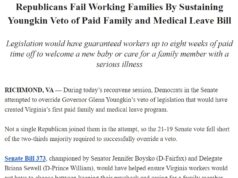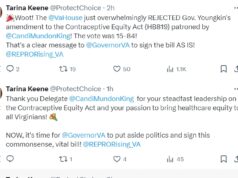In October, I announced my candidacy for the Virginia House of Delegates. On June 13th, this leg of our journey came to an end, and this is how it turned out:

This result isn’t what I hoped for, obviously, and part of me is still adjusting to the fact that I’m no longer running for office. At the same time, though, we ran the kind of people-centered, issues-oriented campaign that I can be proud of. We brought new folks into the process who never voted before, let alone in a Democratic Primary, and we raised the profile of our race to one of the closest-watched in the commonwealth.
Along the way, I learned a lot about people, issues, perceptions, campaigning, and myself. Running for elected office is a transformative experience, and it has the potential to tempt you into being your worse self, or reach higher to get just a bit closer to who you aspire to be in life. I hope I lived up to the latter.
And here’s what I learned:
1. Don’t jump into it unprepared. Running for office isn’t something to be taken lightly, and you have to prepare for it. That means talking to your loved ones, friends, and bosses before you actually commit yourself. If your significant other isn’t on board for sometimes weeks of little contact, or your work situation isn’t one where you can keep flexible hours, it’s a much heavier lift to run. Make sure you have a “kitchen cabinet” of folks to bounce ideas off of, and who’ll support you no matter what.
2. Be prepared to spend a lot of time on the phone. Unless you’re very wealthy, or are fortunate to be part of a very wealthy circle of people, you’ll be spending a lot of time on the phone fundraising. This ties into the flexible work/life schedule — if you can’t take at least an hour or two out of your workday to make fundraising calls, you’re going to have a much smaller universe of folks to ask to contribute. Be prepared to give your pitch and explain why you’re the right candidate for the job over and over again. Be prepared for people to get mad at you, and for rejection.
3. Be prepared to spend a lot of time walking and knocking on doors. Unless you’re running for a statewide or congressional office, in most cases the most effective way to get votes is to knock on doors across your area. The reason for this is two-fold: one, if you’re running a people-centered campaign, you should be actually listening to the concerns and issues of the folks in your area. Two, the most effective way for a candidate to persuade a voter to support them is by in-person contact. Be prepared for a lot of people to not answer the door, or not be home at all, but don’t give up!
4. You’ll learn who your friends are, and who to keep at a distance. Once you’re a candidate, everyone will have their own reasons for interacting with you. Some folks will genuinely want to support your campaign and do everything in their power to help you succeed. Others will approach as friends but be serving their own interest or someone else’s. Others still will show their true colors (hint, opposite of yours) and you’ll want to distance yourself from them. The biggest takeaway here is that allies and friends aren’t the same thing, and neither are opponents and enemies. Most of the time, it isn’t personal, either.
5. Money doesn’t buy votes, but it sure helps. Even the most basic of campaign literature costs money, and that doesn’t get into the food, water, canvassing supplies, and everything else you’ll need to keep your ground game running. Being able to manage your money wisely and raise enough to get your message out there is key, especially now that we live in an age where folks “live” in so many different forms of media. Also be prepared for everyone you meet to have their own opinion of how you should be spending your campaign funds.
6. You need to be adaptable, but decisive. Man plans, God laughs. Even the best-laid plans during the heat of the campaign can be thrown off course by a new development or some stumbling block. Always be prepared to tweak things as time goes on, but don’t be afraid to stick to something you decided to do. Your volunteers and staffers need a steady hand and the helm, and that needs to be you, the candidate.
7. Never lose sight of who you are, and why you’re running. There will be constant pressures pushing you one way or another. Some of these pressures may tempt you into acting outside of how you’d normally behave, or take on an “ends justify the means” mentality. Never forget that after campaign season is over, you still need to live in your community. You’re running for office because you want to improve the lives of those around you, and that’s a task much larger than yourself.
Every conversation at every door is something that can never be taken away from me, along with the fact that there are 1,866 people in my district that believed in our vision and as me to be their state legislator. They explicitly signed on to have me represent the future of their lives and the lives of their families, and I’ll never forget it.
We’ve begun to build the kind of grassroots infrastructure to propel Hala Ayala — the victor in our primary — into the delegate’s seat in November. This same infrastructure can be used for congressional candidates next year, as well as County and State seats in 2019.
We may not have come out victorious on Tuesday, but this isn’t the end, it’s the beginning. All of you Democrats out there have been unbelievably supportive, and I hope that you throw all of your weight behind Hala now that she’s the Democratic nominee. We’ll need you to take out Rich Anderson on November 7th, and to begin writing a new chapter for the 51st — and Virginia — that we can all be proud of.


 Sign up for the Blue Virginia weekly newsletter
Sign up for the Blue Virginia weekly newsletter








